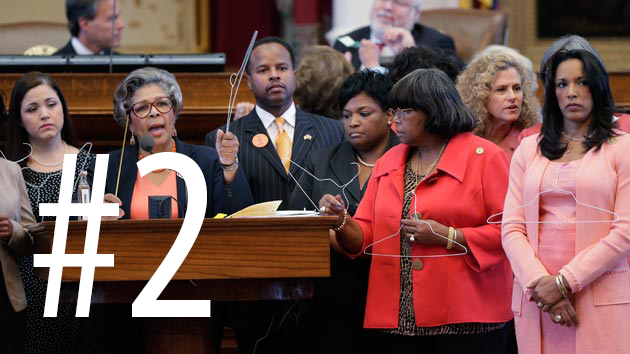A new report finds hundreds of thousands of Texas women have tried to give themselves abortions, because they cannot access clinics. This new study is revving up the abortion debate. The Supreme Court has agreed to hear agreement over the controversial HB2, which has greatly limited women’s access to care.
Mother Jones has the details on the study.
Ever since Texas passed HB2 in 2013, the omnibus abortion law at the heart of a pivotal case the Supreme Court will review early next year, more than half of the state’s 41 abortion clinics have been forced to close. As these closures have mounted, advocates in the state have worried that the decline in abortion access could lead to a rise in the number of women trying to terminate pregnancies by themselves.
A new study quantifies some of those fears: At least 100,000 Texas women—and as many as 240,000—between the ages of 18 and 49 have attempted to self-induce abortions, according to a report released today by the Texas Policy Evaluation Project (TxPEP). The study also found that it is possible that the rate of women attempting to self-induce abortions is rising in Texas as a result of the state’s additional restrictions on abortion care. The report points to previous studies that have explored the correlation between a rise in abortion restrictions and the prevalence of self-induced abortions. A 2008 national study found that about 2 percent of women reported that they tried to terminate pregnancies on their own. In 2012, a year after Texas passed several new abortion restrictions, a study of Texas women seeking care at an abortion clinic found that about 7 percent reported attempting to end their pregnancies without medical assistance before seeking clinic care.
“This is the latest body of evidence demonstrating the negative implications of laws like HB2 that pretend to protect women but in reality place them, and particularly women of color and economically disadvantaged women, at significant risk,” said Dr. Daniel Grossman, one of the study’s co-authors and a professor in the department of obstetrics, gynecology, and reproductive sciences at the University of California, San Francisco, in a press call Tuesday morning.
Amy Hagstrom Miller, the president and CEO of Whole Woman’s Health, an independent abortion provider in Texas and the lead plaintiff in the HB2 case currently before the Supreme Court, reiterated that Texas has seen a rise in self-induced abortions since abortion restrictions like HB2, and that terminating a pregnancy with DIY methods is not healthy for women. “Nobody should be denied safe and compassionate care based on her zip code,” said Hagstrom Miller. “But that’s exactly what’s been happening.
These findings come from a survey of nearly 800 women, ages 18 to 49, conducted by TxPEP over two months in 2014 and 2015. The women were asked if they knew or suspected that their best friend had ever self-induced an abortion, and if they’d ever done so themselves. Overall, 1.7 percent of respondents said they had tried to self-induce an abortion, while 4.1 percent of women said they knew or suspected their best friend had done so. Applying these proportions to the nearly 6 million women of reproductive age in Texas, the researchers concluded that an estimated 100,000 to 240,000 Texas women ages 18-49 have attempted to end a pregnancy alone.
Please read the full Mother Jones piece
Women’s reproductive rights will hang in the balance when the Supreme Court reviews HB2, Texas’ notorious anti-abortion law.
The US Supreme Court has just agreed to hear a case that could potentially decimate women’s reproductive healthcare access in Texas and disastrously undermine Roe v. Wade, affecting millions of women and girls around the country. This is the first major abortion case that the court will hear since 2007.
The case, Whole Women’s Heath v. Cole, focuses on HB2, an omnibus anti-abortion bill passed in Texas in 2013. In the two years since elements of HB2 first took effect, the number of abortion providers in Texas has plummeted—from over 40 to just 19. If the Supreme Court upholds the law, it’s possible that just ten clinics in the state will remain in operation.
The Texas law on which it is based is an outright attack on women and a shameless effort to ban nearly all abortions in Texas.
“This case should not exist,” said NARAL Pro-Choice America president Ilyse Hogue in a statement. “The Texas law on which is it based is an outright attack on women and a shameless effort to ban nearly all abortions in Texas. Laws like the ones being challenged in Texas are designed to subvert the Constitution and end the right to a safe and legal abortion.”
HB2 is what’s known as a Targeted Regulation of Abortion Providers (TRAP) law. TRAP laws function by mandating that abortion providers must meet extremely costly and medically unnecessary standards in order to remain in operation, making it so that many clinics cannot afford to stay open. Specifically, HB2 requires that abortions must be performed in hospital-like ambulatory surgical centers—even though surgical abortion is one of the safest existing medical procedures—and that providers must gain admitting privileges at a local hospital, which is an impossibility for doctors operating in remote or rural areas. Such laws have been proliferating at a rapid pace: In the past three years, nearly 300 abortion restrictions have been passed at a state level, dozens of clinics have been shuttered, and there are now six states with just one clinic remaining.
Read More: Meet the Terrorists in the War on Women
The effects of these restrictions are devastating, especially on lower-income women who cannot afford to drive long distances to access essential reproductive healthcare. In Texas—and in many other states with similar laws in place—many women must now travel hundreds of miles to reach a provider. When HB2 first took effect, multiple outlets reported on the rise of “flea market abortions,” in which Texas women would buy the abortion pill illegally and self-induce at home.
“Unfortunately, ever since a woman’s ability to end her pregnancy was legalized four decades ago, anti-choice politicians have tried to block it,” said Ana Rodriguez DeFrates, the advocacy director of the National Latina Institute for Reproductive Health. “They’ve passed laws to make abortion less affordable, force women to wait, and shut down clinics in our communities. Now we look to the Supreme Court to reject these politically motivated attacks and reaffirm a woman’s basic dignity.”
We look to the Supreme Court to reject these politically motivated attacks and reaffirm a woman’s basic dignity.
At the heart of this case is the “undue burden” standard established by the Supreme Court in another landmark abortion case in 1992, Planned Parenthood v. Casey. According to this ruling, statues have the right to regulate abortion, so long as the regulations they institute do not impose an undue burden on women’s right to choose. Abortion advocates argue that forcing women to drive hundreds of miles to obtain abortion care is certainly tantamount to an undue burden. Supporters of HB2 have literally said that people can drive fast in Texas, so the restrictions are fine.
Read More: How Anti-Abortion Extremists Target Black Women
“For many women, the process of obtaining safe and legal health care has simply become unfeasible. No one should be denied safe and compassionate care based on her zip code, but that’s exactly what this law does,” said Amy Hagstrom Miller, the founder and CEO of Whole Women’s Health, in a statement. “Legislators are effectively forcing these women to carry their pregnancies to term against their will.”
Oral arguments in this case will begin next spring. In her statement, Hagstrom Miller wrote that her heart is “filled with hope” that the Supreme Court will uphold women’s basic rights and “reaffirm that every woman should be able to make her own decision about continuing or ending a pregnancy.”






